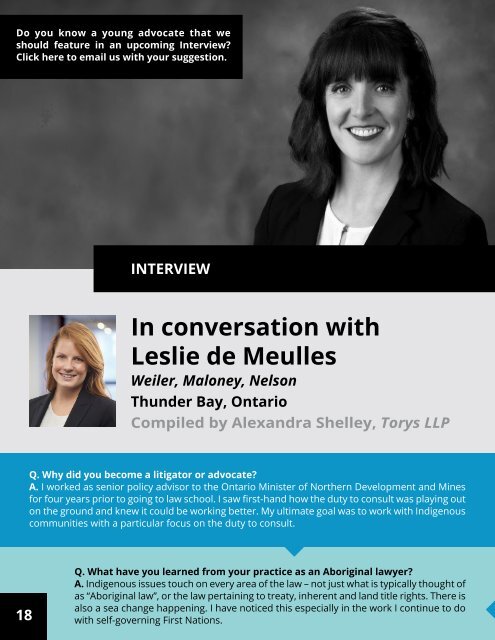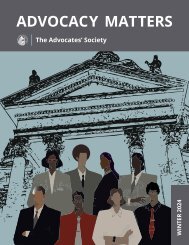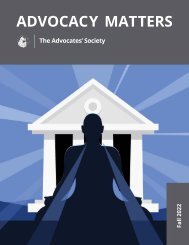Keeping Tabs December 2018
Stay up-to-date on news and events from our Young Advocates' Standing Committee (YASC) with Keeping Tabs.
Stay up-to-date on news and events from our Young Advocates' Standing Committee (YASC) with Keeping Tabs.
Create successful ePaper yourself
Turn your PDF publications into a flip-book with our unique Google optimized e-Paper software.
Do you know a young advocate that we<br />
should feature in an upcoming Interview?<br />
Click here to email us with your suggestion.<br />
Q. What is your year of call?<br />
A. 2017.<br />
Q. What is your greatest extravagance in your<br />
everyday life?<br />
A. Coffee. Always coffee. There is nothing better<br />
than an excellent cup to start the day.<br />
Q. Which talent would you most like to have?<br />
A. I love being on the go and on my feet but sometimes feel restless and impatient when I’m at my<br />
desk. I wish I had more patience for long periods of research.<br />
Q. How would your colleagues describe you?<br />
A. Passionate and energetic – especially after<br />
coffee #3.<br />
Q. Which word do you prefer: litigator<br />
or advocate?<br />
A. Definitely advocate. It sounds more collaborative,<br />
which is how I see my practice.<br />
INTERVIEW<br />
In conversation with<br />
Leslie de Meulles<br />
Weiler, Maloney, Nelson<br />
Thunder Bay, Ontario<br />
Compiled by Alexandra Shelley, Torys LLP<br />
Q. What is your favourite case?<br />
A. It is tough to pick a case in Aboriginal law, as so much of the jurisprudence in the area is problematic.<br />
Even Tsilqot’in, which was an exciting case, had its downside. If I have to pick a case, then<br />
Whiten v Pilot. It is encouraging to see the Supreme Court protect the interests of the underdog<br />
and make a difference.<br />
Q. What would you consider your greatest achievement?<br />
A. I feel grateful to be practicing in the area I aspired to when I started law school. I am also happy<br />
to be living and working in Northern Ontario, where Indigenous issues are at the forefront in a<br />
way that can differ from other parts of the province.<br />
Q. Why did you become a litigator or advocate?<br />
A. I worked as senior policy advisor to the Ontario Minister of Northern Development and Mines<br />
for four years prior to going to law school. I saw first-hand how the duty to consult was playing out<br />
on the ground and knew it could be working better. My ultimate goal was to work with Indigenous<br />
communities with a particular focus on the duty to consult.<br />
Q. What is the latest non-legal book<br />
you’ve read?<br />
A. I just finished There There by Tommy<br />
Orange. I highly recommend it!<br />
Q. What is your favourite take out<br />
cuisine?<br />
A. Thai food!<br />
Q. What have you learned from your practice as an Aboriginal lawyer?<br />
A. Indigenous issues touch on every area of the law – not just what is typically thought of<br />
as “Aboriginal law”, or the law pertaining to treaty, inherent and land title rights. There is<br />
also a sea change happening. I have noticed this especially in the work I continue to do<br />
with self-governing First Nations.<br />
Q. If you weren’t a lawyer what would you be?<br />
A. I would work in politics. It was a privilege to work at Queen’s Park. I learned a lot<br />
and met some of the smartest and best people I know – and that includes all parties<br />
and the public service.<br />
18 19


















